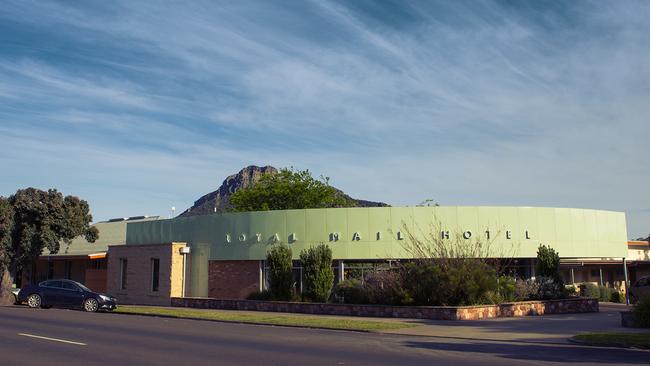The chef on long-term gardening leave
The Royal Mail Hotel, which looks like a flying saucer at the foot of Victoria’s Grampians, is a destination.

THE PLACE
The Royal Mail Hotel, which looks something like a flying saucer that has crash-landed in a tiny village on the southern edge of Victoria’s Grampians National Park, is a destination.
Dunkeld, a three-hour drive west of Melbourne, is strikingly beautiful but it is a place that has never undergone its Copernican revolution: the town orbits the restaurant, not the other way around.
Executive chef Robin Wicken exudes a curious calm, standing on the diner’s side of a giant window which opens into the hotel’s kitchen. Having designed the experience from start to finish he scrutinises every last plate before it heads to the table.
We dine from the eight-course menu, which changes weekly.
Pickled periwinkle with salted fish brandade to begin and cheddar ice cream toward the end are two of the more adventurous offerings, though it is hard to go past the duck served with quince, swedes and turnip for luxury.
The hotel’s new sommelier Marcus Radney is a young but distinguished “wine nerd” — his phrase — and he lobs to the table with the enthusiasm of a man who works for an establishment with a 28,000 bottle cellar, which he does.
“Whatever you find is yours, what I find is mine,” he says while delivering a condensed history lesson of the French-German Alsace region and the lightly sugared wines it has produced.
The Royal Mail Hotel is a destination. From $295 a night, guests can stay in the mountain view rooms located directly behind the restaurant. They open out on to the Grampians.
The clue is in the title. There are standard — cheaper — rooms on site, too, or guests can park themselves at the original Mt Sturgeon homestead which sleeps up to 12 and goes for $1850 a night. The on-site cottages — there’s no TV or Wi-Fi — are between $265 and $325 per night.
THE PRODUCE
A team of pest-control ducks patrol the Royal Mail Hotel kitchen garden hunting for snails.
Should these feathered commandos fail, somewhere between 60 and 80 per cent of all the produce used in the kitchen is gone.
If it’s out of season, it’s not on the menu. The gardener, Michelle, says apart from snails the biggest pests in the garden are the chefs from the Royal Mail who flock in each morning to pick everything they need for the day’s menus.
That menu changes weekly and some dishes even sooner, depending on how long the produce lasts. While some sommeliers match wines on their gut feeling, Marcus sits down each week with the chefs to meticulously pair the alcohol with the meals.
One dish in particular — the cheddar ice cream — works only with the climax of a densely sugared 2009 Chateau Roumieu Haut-Barsac.
There are orchards, olive groves, a snail farm and free range hens for eggs. Bees are kept on site, too, for their honey.
The pickled carrots we experienced early among the eight courses (served with almond milk cream, carrot puree and almonds) hail from the garden. As does the pumpkin that makes more appearances on the menu than there are John Farnham farewell tours.
The caramelised pumpkin with smoked maple ice cream is a delight.
Beef and lamb on the menu are all raised on the hotel’s Mt Sturgeon property. The duck — it really was the standout dish — comes from two hours to the south where Great Ocean Ducks raise Aylesbury birds on a 16ha property at Port Campbell.
Here, in the cool climate, the ducks develop a particularly bouncy layer of protective fat which turns crisp in the kitchen answering that age old riddle.
The ducks go crack.
